
How To Declutter Your Piles Of Paper
So you've decided you need to declutter your paper piles, but when you look at all of it, it looks daunting. How can you ever get through all of those piles?
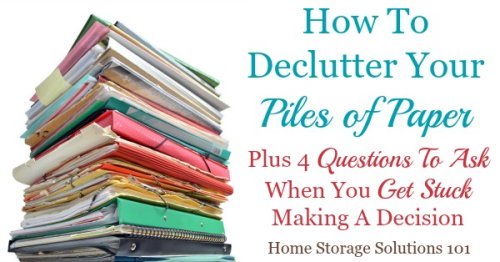
Don't be discouraged or give up before you get started.
Here's how to declutter paper, including tips and tricks, plus 4 questions you can ask yourself when you get stuck on whether to keep a certain piece of paper or not.
These tips will work whether you have one small pile on your counter, or an accumulated collection of 10 years worth (or more) papers in stack after stack, box after box.
Obviously though, the more piles you've got to sort through the longer it takes, but it can still be done.
Get Three Containers Ready When You're Decluttering Paper
I feel like I covered this pretty well in my previous article in this series where I discussed the only strategy that works for organizing paper clutter, but remember that most of the paper you've been saving for years and years is going to get discarded. You're not going to be getting ready to file it or otherwise organize it.
Practically what this means is that you need to be ready, when getting rid of paper clutter, to dispose of a lot of stuff. That means the first step is to get your containers ready.
Largest Container: Recycling Bin Or Trash Can
You should expect that most paper can just be thrown straight into the recycling bin or the trash can, so have a big one handy.
Middle-Sized Container: Paper With Personally Identifiable Information
There may also be certain papers that you come across that have personally identifiable information. When taken as a whole this is a much smaller amount of stuff then what can be trashed, although certain pockets of documents, like from the bank, might all need to be shredded.
Whenever you do come across such papers have a medium sized container that you can hold them in until you can shred or otherwise destroy them.
Please note that my article about what documents to shred versus trash (or recycle) can help you identify what stuff needs to be shredded or destroyed. Since shredding is an additional step you only want to expend the energy to shred or destroy papers when it's necessary. Just recycle or trash as many pieces of paper as possible!
(When you're ready to shred, if you've got a lot you might want to use a paper shredding service that will shred everything for you. However, if you want to do it yourself also make sure to check out these criteria for choosing the best home paper shredder, so you get a machine that's up to the task.)
Smallest Container: Paper You'll Save For Filing
Finally, the smallest stack when you're sorting should be for papers that you'll actually keep.
There won't be as many of these as you might imagine, and once you've got such a stack I'm going to have you look through it again, giving it a second pass, because I bet you'll be able to discard even more on a second pass through!
To help you know what types of papers you should keep and how long, make sure to check out the how long should you keep papers article here, which even provides a printable one page cheat sheet to help you know how long to keep everything from tax returns, pay stubs, credit card bills and more.
Deal With One Reasonably Sized Pile At A Time So You Don't Get Overwhelmed
I know what it feels like to look at all those sheets of paper, the magazines, the binders, the file folders, and on and on, and just have your eyes glaze over.
It seems like such a monumental task that you don't feel like starting.
But starting is often the hardest part. So to make it less overwhelming focus not on all the piles of paper, but just on one reasonably sized pile at a time.
You may need to separate out a reasonable amount from a bigger pile yourself to do this, which is completely fine. Your motto -- one pile at a time!
Choose A Reasonable Amount Of Time To Attack Your One Pile So You Don't Make A Huge Mess
Have you ever taken on a decluttering project just to look around at the end of the time you can devote to it and wonder when the tornado passed through your home?
It can be very disheartening, and another reason we often give up in dealing with all our stuff.
Realistically most people can't deal with all their paper piles in just one decluttering session, so you know practically you'll have to stop before the task is complete, and then start again later.
When you stop don't leave it a mess or it will be so much harder to re-motivate yourself for the next session.
To avoid this problem choose a reasonable amount of time to attack the one pile.
So what's a reasonable amount of time? You know me, I love 15 minutes! After all, I run the Declutter 365 Missions here on the site, with a daily 15 minute decluttering mission for each day of the entire year!
So my personal suggestion is 15 minute decluttering sessions. Ten of those minutes you'll declutter, and the last 5 minutes you'll clean up.
Those last five minutes could include taking out the full recycle bin, or shredding the few papers you found that needed it, or putting the few pieces of paper that should be filed into its designated area (notice I didn't say to file them yet!)
It could also just mean putting the rest of the unsorted paper back in the box it was previously stashed in for another session later, instead of leaving it out and in the way.
If you feel energetic, and you have time, you can do several 15 minute sessions in a row. And trust me, when you begin to get on a roll with your decluttering you may just want to do that.
But following the plan of 10 minutes decluttering, 5 minutes clean up, and just repeating that, will allow you to stop when needed without a huge long clean up at the end.
Then, just do some more the next day. It may take you 10 sessions or 1000 to get all of your paper clutter dealt with, using this method, but every session is progress. And consistency and habit will help you eventually accomplish your goals.
In fact, here's the Declutter 365 Decluttering & Shredding Paper Mission, which includes a hall of fame from some readers who've already taken on this mission, to inspire you and get you started with your 15 minutes at a time!
Don't Try To File Papers Or Otherwise Get Distracted During Your Declutter Sessions
When you're decluttering paper it is very easy to get distracted. You come across things you haven't seen in ages, and it can be fascinating, or upsetting, or make you remember something you need to do, or . . . you name it.
Another advantage of short sessions for decluttering is that it is easier to focus, and not get distracted during those shorter time periods. You won't get anything done if you stop and reminisce.
I also don't encourage you to actually try to file anything right away when you're doing these sessions, not even during the clean up.
One of the reasons is that often you can find even more stuff to purge by looking through your filing pile again during a second pass.
Another reason is that if it has sat in piles this long it can sit just a while longer to actually get filed without any additional harm. So focusing on accomplishing one task at a time is a good thing!
Little Tricks To Make You Feel A Sense Of Accomplishment Quickly While Getting Rid Of Paper
It is so much easier to get and stay motivated when you feel like you're accomplishing something. Here's several tricks you can use to feel like you're getting a jump start to keep you going and enthused.
- Pull all the thick stuff out of your stack first, to deal with. Those magazines, catalogs, and bound papers are thick but each require one decision for the whole thing. That allows you to whittle down the pile very quickly before you have to go piece of paper by piece of paper.
- Flip your piles of paper over. The oldest papers are often the easiest to get rid of, so if you want to feel a sense of accomplishment quickly just flip over the pile and deal with the oldest stuff first to again just toss most of it!
What To Do When You Get Stuck On Whether To Keep A Piece Of Paper: 4 Questions To Ask Yourself
Everyone has been there. You're rocking along with your decluttering, your piles of paper are slowly but surely being whittled down. Then, boom, you come across something and you just can't decide whether to toss it or keep it.
It really slows down your momentum and makes the process feel rather painful.
So to try to avoid that keep these four questions in mind when you need to decide what to toss versus what to save. And I suggest erring on the side of tossing it personally!
Question 1: Is there a specific circumstance where this information would be useful again?
If you have to ask yourself these four questions you obviously feel a vague sense of "I might need it later," or you wouldn't be questioning whether to keep that paper.
But that vague and undefined feeling is not a good enough reason to keep something.
In fact, for many people, that vague feeling is what got them buried under a mountain of paper clutter to begin with.
So you've got to accept that that feeling, without more, is not enough.
Instead, ask yourself if there is a specific circumstance where the information contained on that paper would be useful again.
An example might be if you would need it legally if you had a tax audit. That is a specific reason to keep something.
As mentioned above, I know it is hard to know what legally or practically needs to be kept so I've done the research for you. Check the home document retention cheat sheet here to help you figure out what needs to be kept, and for how many years.
Question 2: How hard would it be for me to get this information again if I ever need it?
The next question to ask allows you, in some circumstances, to still get rid of papers even if you've got a specific circumstance in mind where it could be useful again.
An example of this might be your owner's manuals for certain appliances. Yes, there are specific circumstances you might want to reference that manual again. For example, to diagnose a problem that is occurring with the appliance.
However, these days many of these manuals are available online from the manufacturer. So even if you did need to reference it again in the future it wouldn't be too hard to get access to it again.
Depending on how much room you had for filing versus how likely you felt it was you'd need to reference the manual often, you might use this second question to help you make the decision to toss that manual.
On the other hand, say for the tax audit example above, perhaps it would be extremely difficult to get the information again, because you need that exact sheet of paper. Well, this question just confirmed for you that you made the right decision to keep the document.
Question 3: How recent and up to date is this information?
As I mentioned above the older the paper the more likely that you can toss it. For example, you need to save certain tax documents for seven years. However, in the eight year the documents that were once important to save just became unimportant.
You can also use this question to help you make decisions about training materials, or research, and things of that nature. Information, as it ages, and more research and information comes out, can become stale and lose its value. Being realistic about how much information the 20 year old science textbook provides says you should toss it!
Question 4: Is it actually worth my time to file this piece of paper and have to deal with it again?
Finally, this last question I will admit is rather squishy, and hard to wrap your head around. But it can be important.
You need to realize that for everything you keep in your home, from big items to single sheets of paper, you will expend energy to deal with it again.
This is especially true with paper because if you decide to keep it you're going to have another step later once you've decluttered all your piles of paper, when you'll need to organize and file it away.
Your time and energy are valuable. If you don't find the information contained in that paper has enough value to be worth the time it will take you to deal with it again, then the answer is clear -- toss it!
Get This Paper & Filing Decluttering Checklist + 32 Other Decluttering Checklists For Your Home
Right now you're decluttering your papers and files, and there's a lot of types and varieties of these around your home.
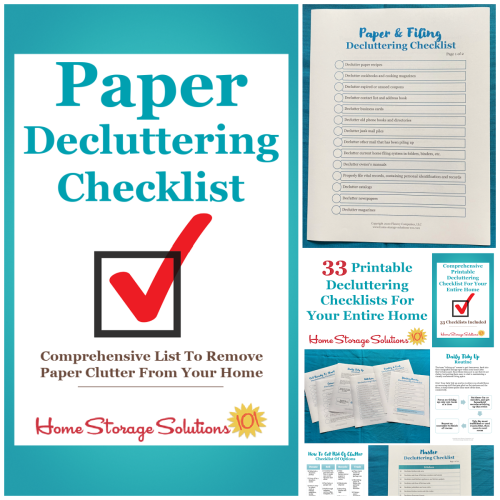
I've done the hard work of breaking down these tasks into smaller more manageable steps for you, so you don't get overwhelmed or worry you're forgetting a task, and you can go at the pace you want, whether that's fast or slow.
In addition, you can tackle these decluttering tasks in whatever order you want when you use these checklists!

What's Next In The Paper Organization Series?
So I hope you're excited, and ready to begin your first 15 minute decluttering session to begin the journey of decluttering your paper piles.
When you're sorting your papers you may have questions about what to shred, and how long to keep various documents. So, those are the next two topics that are coming up in the Paper Organization Series.
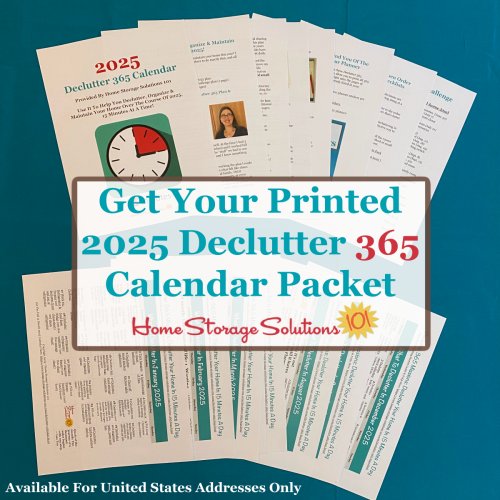
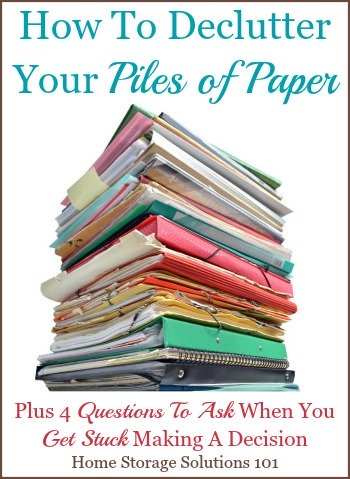

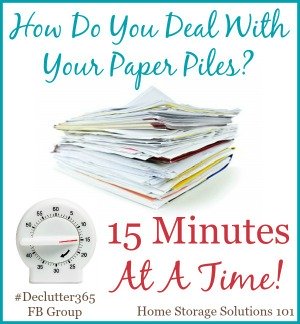
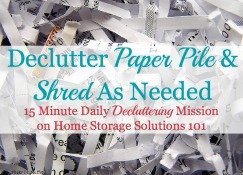
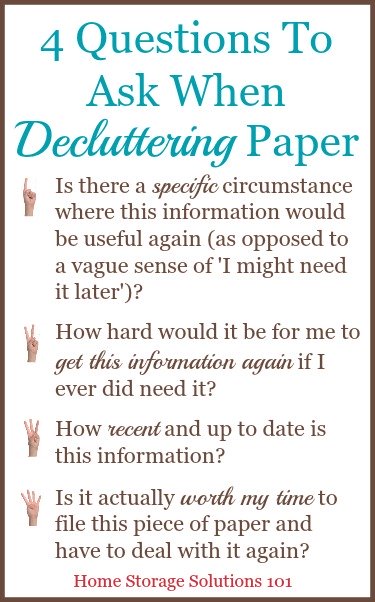
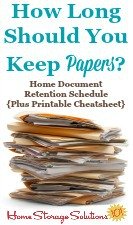
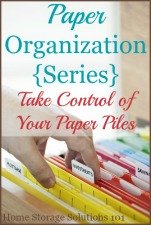
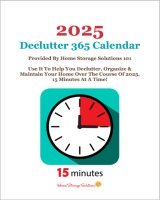
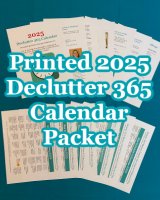
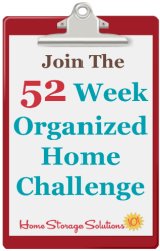



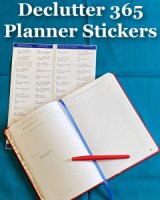

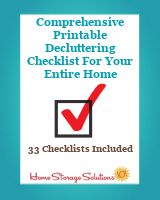




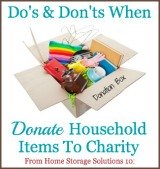
Share Your Comments, Tips & Ideas
I would love to hear from you, sharing your thoughts, questions, or ideas about this topic, so leave me a comment below. I try to always respond back!